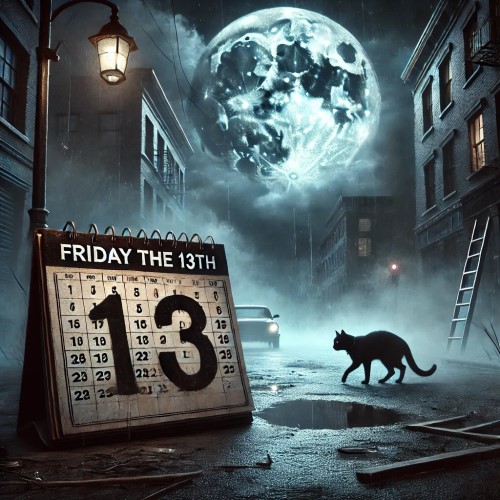Unraveling the Mystery: The Psychology Behind Friday the 13th Superstition

Unraveling the Mystery: The Psychology Behind Friday the 13th Superstition
Friday the 13th is often considered one of the unluckiest days in many Western cultures, marked by a sense of dread or apprehension. Whether it’s avoiding certain activities, postponing important decisions, or even staying home, the date has earned a reputation for being ominous. But where does this belief come from, and why does it hold such a strong grip on people? To understand the psychology behind the superstition, we have to look at a mix of cultural history, cognitive biases, and the way human brains are wired to seek patterns.
The Origins of Friday the 13th
The fear surrounding Friday the 13th is deeply embedded in Western culture, though its exact origins are murky. One theory links it to two separate sources: the day Friday and the number 13, both of which have been considered unlucky independently throughout history.
- Friday: In Christian tradition, Friday holds significance because it is believed to be the day of Jesus’ crucifixion. This association with death and sacrifice gave Friday a somber tone in certain cultures.
- The Number 13: The fear of 13, or triskaidekaphobia, also has ancient roots. In numerology, the number 12 is often seen as “complete” (e.g., 12 months in a year, 12 zodiac signs), while 13 feels like an irregularity, disrupting the order.
These elements likely combined over time to create the fear specifically attached to Friday the 13th.
The Power of Cultural Conditioning
Superstitions like those surrounding Friday the 13th are often reinforced by cultural cues and media. Think about how often movies, TV shows, and even books reference the “unlucky” nature of this day. From horror films like Friday the 13th to casual references in everyday conversations, the association with misfortune is constantly being re-emphasized.
This cultural reinforcement can affect the way people behave. If someone believes that bad things are more likely to happen on this date, they may subconsciously alter their actions, making them more prone to accidents or mistakes—therefore reinforcing their belief. It’s a classic example of a self-fulfilling prophecy.
Cognitive Biases at Play
A key factor in the psychology behind Friday the 13th is something called confirmation bias. This is when people pay more attention to information that supports their existing beliefs and ignore information that contradicts them. So, if someone expects bad things to happen on Friday the 13th, they are more likely to notice or remember anything that goes wrong, no matter how small.
Another cognitive quirk, known as the availability heuristic, also plays a role. This is when people judge the likelihood of events based on how easily examples come to mind. Since we’re constantly exposed to the idea that Friday the 13th is unlucky, any misfortune that occurs on this day seems more significant.
Why Superstitions Stick Around
Superstitions tap into the human need for control. Life is unpredictable, and bad things happen for reasons that are often beyond our control. Superstitions provide a way for people to impose some sense of order on the chaos. By avoiding certain activities or taking precautions, people feel like they have a way to reduce the risk of something bad happening, even if there’s no rational basis for it.
For some, it’s a form of stress relief. Superstitions, in this case, are almost like a ritual that gives a person comfort. Whether it’s avoiding walking under ladders, not breaking mirrors, or staying cautious on Friday the 13th, these small actions can help reduce anxiety.
The Modern Impact of Friday the 13th
While many people in modern society are skeptical of superstitions, the belief in the bad luck of Friday the 13th persists. Studies have shown that some people avoid traveling or making major purchases on this day. Interestingly, there is some evidence to suggest that Friday the 13th can lead to fewer accidents because those who believe in the superstition may be more careful.
However, for others, it’s just another day. They might joke about it or recognize the cultural significance without letting it affect their behavior.
Breaking Free from the Fear
For those who find themselves caught up in the fear of Friday the 13th, it can help to reframe the day. Instead of focusing on the negative, try to see it as an opportunity to challenge your mind’s tendency to look for patterns in random events. Consider doing something fun or uplifting on Friday the 13th to counterbalance any feelings of dread.
Ultimately, the belief in the bad luck of Friday the 13th is a mix of cultural conditioning, cognitive biases, and our brain’s natural inclination to search for meaning in the world. While it may never fully lose its place in Western culture, recognizing the psychology behind it can help us understand why these superstitions stick around—and why they don’t have to control our lives.
Friday the 13th is a fascinating example of how cultural myths, historical beliefs, and psychological tendencies converge. While it might always carry a sense of mystery or foreboding for some, understanding the psychology behind it can make the day feel less daunting. Whether you believe in its unlucky reputation or not, it’s a reminder of the complex ways our minds and cultures interact to shape our perceptions of reality.






